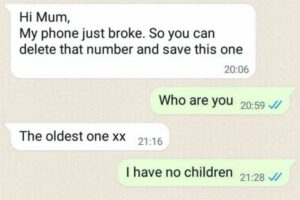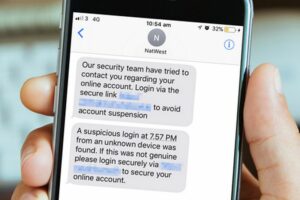Cyber criminals are getting smarter every day and are always finding new and creative ways to catch people out. Falling victim to a scam can be damaging not only financially but also emotionally, with the stresses of everyday life. We’ve highlighted a few of the most prevalent scams at the moment.
“Friend in Need” scams
The “Friend in Need” scam or “Hello Mum” scam tries to pull on people’s heartstrings. This scam involves receiving a text or WhatsApp from an unknown number pretending to be a loved one in need of money for whatever reason. These messages usually start with Hi Mum or Hello Mum and will lead into a request to transfer money.

https://www.chroniclelive.co.uk/news/uk-news/hi-mum-whatsapp-scam-text-25033344
Price comparison phone scam
With the majority of the country worrying about our energy bills, it’s no surprise that scammers are using this to their advantage. Cyber criminals are calling people pretending to be from well-known price comparison sites offering better deals if they switch immediately.
At the moment of writing this, there are no tariffs worth switching to and many providers don’t allow you to switch at all. This means you can assume any contact about such an offer is likely to be a scam. You can always reach out to suppliers directly to confirm this.
Suspicious activity on your account scam
This scam is basically a double bluff. Scammers send a text or phone call claiming that there’s been suspicious activity on your bank and your account has been frozen. They will then ask you to confirm your identity by giving away personal information. This is in fact the scam. So it’s a scam hidden behind a scam!
Sometimes you can tell a scam from the phone number, but these days scammers are able to use technology to make their real phone number look legit.
If you ever receive a phone call like this from your bank, always remember your bank will NEVER ask you for your PIN number or any passwords for online banking, and the same applies to text messages. So, if you do receive a phone call or message from your ‘bank’ asking for your details, it’s most likely a scam.
If you ever want to double check that it is your bank, then you should ring your bank from a different device as scammers are able to stay on the line once you’ve hung up and reconnect to the call when you do try to ring your actual bank, pretending to be them again.
This scam only works if the recipient really does have children or grandchildren so is a bit of a shot in the dark. However, scams like this will target quantity over quality with the assumption at least some will fall for it.
So, what can you do to help prevent this scam? If you feel any slight suspicion about a request for help from one of your supposed loved ones, then the best thing to do is to contact the person they are claiming to be in person of over the phone, before you make any transactions.

https://www.gazettelive.co.uk/news/teesside-news/text-message-scam-fraudsters-pose-14137418
Proceed with caution!
These are some common scams that are happening at the moment all across the UK, but this list isn’t exhaustive. There are plenty more tactics that cyber criminals are using so you should always be wary when receiving a random text message, email, phone call, etc. Whether it’s supposedly from your bank, an unknown number claiming to be your child or anything else, you should always double check that it’s real before taking action.
Received an email you’re not sure if real? Check out our post “Help is this Spam“

